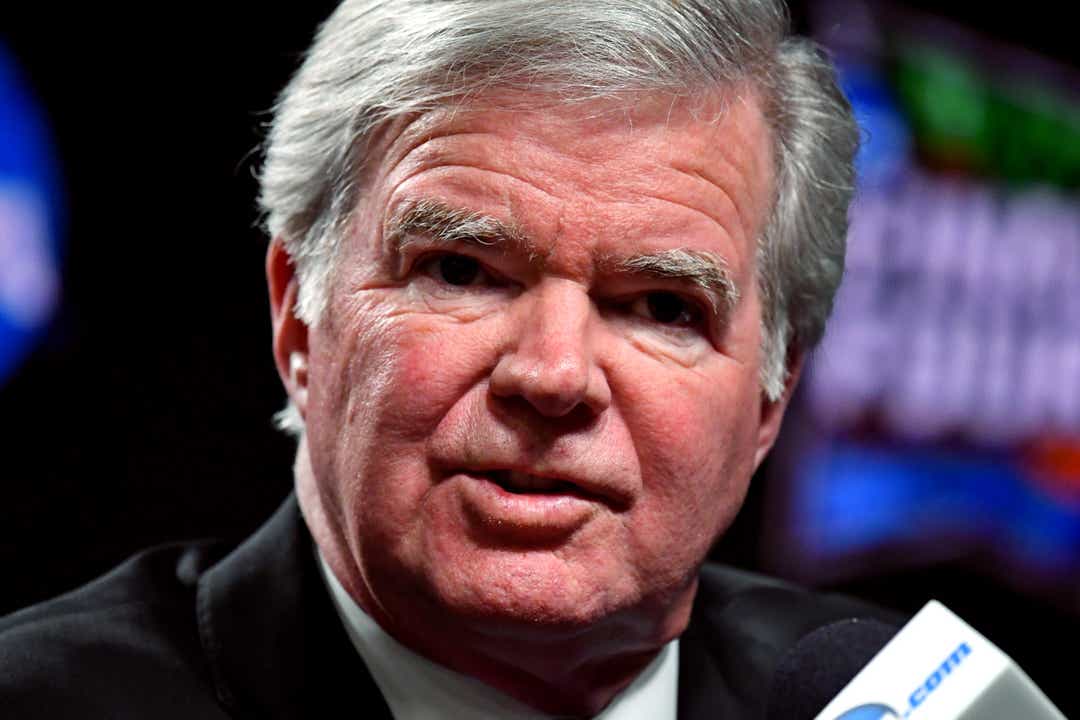Even now, in the time of social distancing, on a wind-swept day of numbing cold and snow flurries, the pilgrimage moves on. Park near the north entrance to Michigan Stadium and watch the cars arrive, their occupants spill out, cameras in hand, and pose before the metal black gates, the two-story block “M” in the backdrop.
It may be cliché to think of this place as a shrine, or sacrilege to consider it a cathedral, but for those who come to see it, to mill about its perimeter, to gaze at the rim of its upper bowl muscling up from the earth, the allure is indeed akin to something heavenly.
At the moment it is still, quiet, empty. The thought of the coronavirus pandemic keeping it in its sleepy state this fall is unsettling.
RADICAL PLAN: Jim Harbaugh's idea for college football players makes sense
IMPORTANT STEPS: NCAA outlines key principles for restarting college sports

No sporting place elicits such feeling as the fields that house our most iconic college football programs. And no sport relies more on gathering in place, on throaty passion, on human connection in the flesh.
Think about its immediately identifiable soundtrack, a mass of drums and woodwinds and horns. Those are college students creating that harmony of concussive and brassy noise. Without the bands, without the students in general, what is left?
How can student-athletes be asked to dress and play if their fellow students remain at home?
They can’t. And shouldn’t.
Which is why science should decide for them.
Most athletic directors and school presidents agree — U-M athletic director Warde Manuel recently said he couldn’t see games being played unless students were back on campus.
If it were up to NCAA president Mark Emmert, no games would be held until students return. In his mind, it’s a simple existential equation.
“College athletes are college students,” he said Friday during a live conversation on the NCAA’s Twitter channel, “and you can’t have college sports if you don’t have college (campuses) open and having students on them. You don’t want to ever put student-athletes at greater risk than the rest of the student body.”

And yet?
West Virginia president E. Gordon Gee told Yahoo Sports last week that “the mental health of the nation needs to be served also. There’s a battle going on between science, politics and common senses. Up to this point, science has won and rightly so. We need to start finding the middle ground and manage those middle grounds.”
These words shouldn’t surprise. The idea that college football is integral to the mental health of the nation is the reason why fans take pictures of empty stadiums on blustery, unseasonably cold days in May.
The game has the pull of religion. Nowhere is that stronger than in the South, which is why SEC commissioner Greg Sankey, who leads the most powerful conference in the sport, has said the league is focused on playing as scheduled first and that if the league must adapt, it will.
Sankey recently told CBS Sports that “playing football is important to us. (President Trump) has remarked about his travels to our LSU-Alabama game last year. I think there is a great deal of focus, properly, on what the SEC does.”
Because there is no single entity that controls the game — the NCAA merely sets the rules — it will be up to governors to decide when and how and if there is a season.
Here in Big Ten country, where the politics are different than in the South, and where football isn’t enmeshed in the region’s identity in the same way, the language of the decision makers is a bit different.
Big Ten commissioner Kevin Warren told CNBC last week the decision to play this fall will be made on the advice of experts. And that he and the conference aren’t in a hurry to decide.

“I’m looking to be in a position in the next six to eight weeks to see if we will have sports in the fall,” he said. "But even bigger than sports in the fall is we’re collectively focusing on what we need to do to have school in the fall. If we don’t have school in the fall, we don’t have sports in the fall.”
Many schools — including U-M — are planning on reopening classes this fall on a limited basis and hope to combine virtual learning with on-campus learning. Schools will shrink not just the curriculum but the number of students in any given classroom.
Along with social distancing measures and a society that’s used to living in the time of COVID-19, maybe our campuses will slowly motor back to life. Whether this will work and be enough to justify a return to football is a different question.
It’s easy to understand why Sankey and many others in the college football world want to plan on September kickoffs. And it’s not just about good vibes and bragging rights. At many universities, college football supports every other sport on campus, except for basketball. No college football, no athletics. P period.
Which means at some point there will need to be a season. Shortened. Delayed — next spring? Regional. Whatever.
It’s vital to collegiate athletic life.
But universities lead much of our scientific and intellectual life, too. And as important as college football remains, campuses are not here to entertain us, no matter how often we stop to gaze and take pictures at their stadiums.
Contact Shawn Windsor: 313-222-6487 or swindsor@freepress.com. Follow him on Twitter @shawnwindsor.
"football" - Google News
May 10, 2020 at 09:35PM
https://ift.tt/2yxXqNb
Opinion: College football may be a religion. But science should decide its future. - USA TODAY
"football" - Google News
https://ift.tt/2ST7s35
Shoes Man Tutorial
Pos News Update
Meme Update
Korean Entertainment News
Japan News Update
Bagikan Berita Ini














0 Response to "Opinion: College football may be a religion. But science should decide its future. - USA TODAY"
Posting Komentar